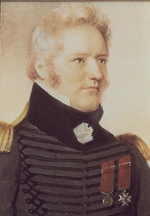Charles-Michel d’Irumberry de Salaberry
|
Lieutenant Colonel Charles de Salaberry CB |
|
|---|---|

Lieutenant Colonel Charles-Michel d'Irumberry de Salaberry in 1825 by Anson Dickinson
|
|
| Member of the Legislative Council of Lower Canada |
|
|
In office December 14, 1818 – February 27, 1829 |
|
| Personal details | |
| Born |
19 November 1778 Beauport, Province of Quebec |
| Died |
27 February 1829 (aged 50) Chambly, Lower Canada |
| Nationality | Canadien |
| Political party | Château Clique |
| Relatives | See descendants |
| Religion | Roman Catholicism |
| Military service | |
| Allegiance | Lower Canada / British Empire |
| Service/branch | British Army |
| Rank | Lieutenant Colonel |
| Commands | Canadian Voltigeurs |
| Battles/wars | |
Lieutenant Colonel Charles-Michel d'Irumberry de Salaberry, CB (November 19, 1778 – February 27, 1829) was a French-speaking Canadien of the seigneurial class who served as an officer of the British army in Lower Canada (now Quebec). He won distinction for repelling the American advance on Montreal during the War of 1812.
Born at the manor house of Beauport (east of Quebec City) in Lower Canada on November 19, 1778, the son of Ignace-Michel-Louis-Antoine d'Irumberry de Salaberry. Charles was one of four sons in a family with a long tradition of military service. Generations of the family had served as officers of the Royal Army in France, and then in the New World. When the British acquired Canada in 1763 the family continued its military traditions in British Imperial Service. Charles-Michel's father, Ignace de Salaberry, was Seigneur de Chambly et de Beaulac, and was also a British Army officer who had fought in the defence of Quebec during the American Revolutionary War, and later served as a member of the Legislative Assembly of Lower Canada, and the Legislative Council of Lower Canada.
At the age of 14, Charles-Michel followed his father's footsteps into the 44th Regiment of the British Army. He soon transferred to the 60th Regiment and saw action with them in the West Indies. Shortly after landing in St. Domingue, his battalion was reduced to 200 men through the effects of yellow fever, and endured a march through the countryside to undertake the siege of Fort Matilda. de Salaberry was subsequently cited for bravery, maintaining his duties during the siege which killed or wounded all but three of the battalion's remaining 200 men. He was charged with the evacuation of the surviving men, despite the difference in age and rank.
...
Wikipedia
